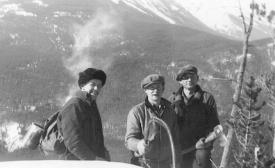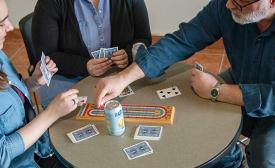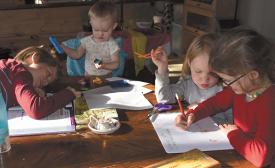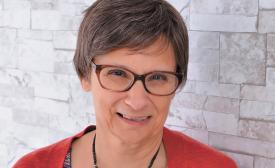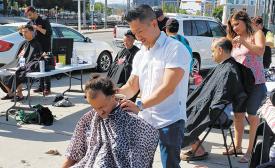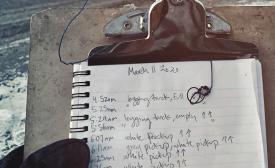Volume 24, Number 9
Testing the ties that bind
More than a month into physical distancing in Canada, and the church seems to be flourishing. Does it seem that way to you?
Encounters with the church in Cuba
Readers write: April 27, 2020 issue
Let Wet’suwet’en exercise their right to self-determination
Re: “Who do you support when a community is divided?” Feb. 17, page 20.
‘Peace be with you’
There is a post-resurrection story that I find helpful this Easter as I contemplate the changing world around me.
CO foresters
Conscientious objectors (COs) played an important role on the Canadian volunteer scene during the Second World War. Among the assignments was work in the forests around Banff, Alta., clearing trees. Surprisingly, much of the parks system in Canada was established by these people, some of whom were less than willing to be there or do the work.
Work-play-rest
As our life has quite abruptly and drastically shifted, along with everyone’s around the globe, I have been reflecting on our daily rhythm and working at reorganizing our schedule into a work-play-rest rhythm.
Salt for the earth
These weeks of physical distancing, including Easter, have forced us to think more about what it means to be the church. We appreciate the phrase “the church has left the building!” We identify with Jesus’s disciples on Easter, huddled behind locked doors, filled with fear and despair. I have begun thinking about the church in these days using two more images from Jesus.
The power of paradox
Christianity is rooted in paradox. A paradox is when two or more incompatible truths are held together to reveal a deeper hidden truth. An example of a paradox in Christianity is that the Kingdom of God is both already here and still coming in the future. Other examples include:
Mennonites explore virtual worship
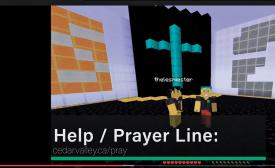
The Easter worship service of Cedar Valley Church in Mission, B.C., was livestreamed on YouTube and Facebook. It included singers and instrumentalists performing from separate locations, a message from Pastor Rob Ayer, and information about a Minecraft Easter egg hunt for children. (Photo from YouTube video)
“We’ve been thrown out of the boat and now we’re learning to walk on water!”
MCC set to address COVID-19 threats
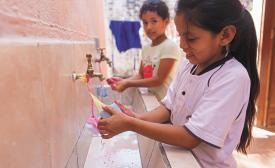
Thiciano Pareja Saucedo, 8, washes her hands at El Comedor de Niños, an after-school program for children in the Montero area of Bolivia, about an hour from Santa Cruz. One of its main goals is to improve nutrition and health outcomes in the community by teaching children about healthy eating, gardening and hygiene. (MCC photo by Matthew Sawatzky)
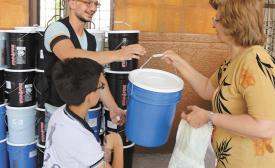
Middle East Council of Churches, an MCC partner, distributed MCC relief kits, which contain hygiene supplies, to the most vulnerable displaced people and host community members in a neighbourhood in the Syriac Orthodox diocese in Aleppo, Syria, in 2016. This year, MCC’s partners in Syria and Lebanon will distribute individual hygiene kits and food to help people protect themselves from the novel coronavirus. Names are withheld for security reasons. (Photo courtesy of MECC)
As COVID-19 spreads and worsens, Mennonite Central Committee (MCC) continues its worldwide work while attending to the health and well-being of its staff.
Westview adapts outreach during pandemic
How does a community fellowship deal with the current physical distancing and self-isolation situation that everyone is facing?
Caring during COVID-19 crisis
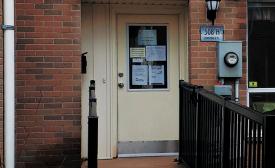
House of Friendship’s Sunnydale Community Centre, usually a hub for a diverse range of community programs, is quiet, its programs cancelled or modified due to pandemic protocols outlined in the notices on the door. (Photo by Janet Bauman)
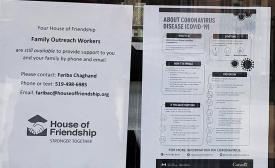
House of Friendship’s Sunnydale Community Centre, usually a hub for a diverse range of community programs, is quiet, its programs cancelled or modified due to pandemic protocols outlined in the notices on the door.
Notices on the door of House of Friendship’s Sunnydale Community Centre in Waterloo, Ont., explain the pandemic protocols that have led to the closure of the centre and the cancellation or modification of its diverse range of community programs. (Photo by Janet Bauman)
How do you stay home when you don’t have a home? How do you physically isolate when you already seem invisible? How do you wash your hands frequently when public facilities are closed?
Doing justice in a pandemic
COVID-19 has altered the lives of most Canadians, but for those in prison and those reintegrating into society after prison terms, the pandemic’s impact is enormous.
Bread, masks and serving seniors
Tim and Sandra Kuepfer of Vancouver are among those doing their part to keep themselves and those in their neighbourhood safe during the current pandemic.
20 tips for surviving school at home
Many families are spending more time together at home these days, requiring greater parental involvement in schooling.
Online paska contest a resounding success
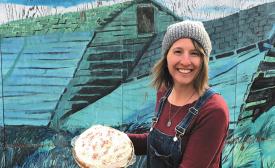
Heather Driedger, shown here with her own paska, held a virtual paska bake-off via Instagram this Easter. (Photo courtesy of Heather Driedger)

This braided paska by Holly Brown of Germany tied for first place in Heather Driedger’s paska bake-off. (Photo courtesy of Heather Driedger)
She couldn’t gather family and friends around her table to eat paska this Easter, so Heather Driedger decided to hold a virtual paska bake-off instead.
‘A well-nourished spirit’
Sue Steiner left behind a huge legacy when she passed away on Aug. 26, 2019. As beloved wife to Sam Steiner for 50 years, treasured aunt to a number of nieces and nephews, and a cherished member of several circles of close friends, she left personal legacies. As a woman who served the church as pastor, clergy coach and trainer, writer and spiritual director, she influenced many.
We need more Peters!
“We need more Peters! He’s only one man,” exclaims ex-offender Kayel Truong, when asked about the Bridges Ministries program run by Mennonite Central Committee (MCC) Alberta to help prisoners of faith successfully reintegrate into the community.
Not so radical after all
While people across Canada and around the world self-isolate from COVID-19, work continues on the Coastal GasLink (CGL) pipeline in northern British Columbia, without the full consent of the Wet’suwet’en people. The 670-kilometre long pipeline plans to snake through Wet’suwet’en territory and export liquefied natural gas around the world.






